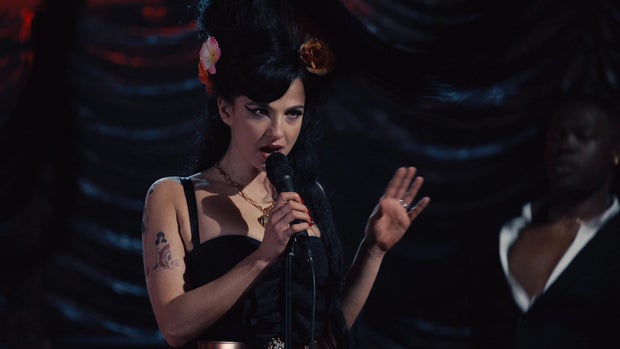Trying to capture a life on film – let alone one as complex as Amy Winehouse’s – can be a challenge. When it comes to biopics, critics often take shots at both sides, calling them exploitative or sanitized. It’s not for the fearful director. But according to Sam Taylor-Johnson, “There’s something about tackling difficult subjects where I just think, Come, let’s go!“
Taylor-Johnson’s film “Back to Black,” a drama about the life and music of British singer Amy Winehouse, was already generating interest long before its U.S. release this week. While Taylor-Johnson was filming, photos from the set were published, sparking fierce reactions. “Yes, it was difficult at first,” she said, “not because I read anything, because I try not to read anything.”
Doane asked, “But should you be aware when people say, this is ‘revolting’?”
“No, actually I wasn’t. Thanks for letting me know!” Taylor-Johnson laughed. “I make sure everyone on set doesn’t tell me anything. Because I won’t be able to make the movie I want to make if I start hearing people’s differing voices or opinions.”
“Back to Black” focuses on the production of the album of that name. It chronicles an intensely creative and complicated period for the multi-platinum artist, who ended up producing just two albums before dying of alcohol poisoning at just 27.
Focus Features
Winehouse’s bold charisma, that voice and her distinctive musical style made her a star. She won five Grammys for her album “Back to Black.” But along with her success, the singer’s struggles have been well publicized, including her battle with alcohol and drugs, and tumultuous relationship with her husband, Blake Fielder-Civil.
Samir Hussein/Getty Images
But with so much written and said about Winehouse, was there something the director wanted to convey that she felt the audience didn’t know? “I think what I wanted to do was create the whole person,” Taylor-Johnson said. “And much of what we knew about her was fed to us by the tabloids. And with our film, it’s about really being with her as she creates the music, and that’s a perspective that I don’t think we’ve necessarily felt or seen.”
Before the hive and before all the attention, Winehouse’s talent and self-confidence were already apparent at age 20. In an interview with British TV in 2004, the presenter asked him about the pressures of his record company:
Jonathan Ross: “Did they try to shape you in any way? Did people ask you to do things to change the way you looked, spoke, or behaved?”
Amy Winehouse: “Yes! One of them tried to shape me into a big triangle and I said, ‘No!'”
Taylor-Johnson said: “It was one of the first times I saw her in an interview, and I remember thinking, she’s funny and so quick.”
Taylor-Johnson turned to Marisa Abela to play the singer. And while other actresses showed up to the audition with Winehouse’s signature beehive hairstyle and eye makeup, Abela did not. “I felt it was important to inhabit Amy from the inside out.”
“Sunday Morning” met Abela at Abbey Road Studios in London, where she recorded vocals for the film, with Winehouse’s old band. “It was incredible,” she said. “I mean, it was stressful, as you can imagine – not only are they incredibly talented musicians, but they are Amy band – my first time singing with any band!”
During the audition, Abela told the director that he couldn’t sing. “There are jobs where you say, ‘Yes, of course I can ride horses or fight with swords.’ But for this, I didn’t want to go in through the back door,” she said.
And what did Taylor-Johnson think? “It’s okay, because I kept thinking we’d figure out a way. And that way, I think, you know, will be kind of lip syncing and lip syncing. But it also felt unsatisfying to do it that way.”
In the end they did no I need dubbing – Abela trained and sang the entire film.
To watch the trailer for “Back to Black,” click the video player below:
Taylor-Johnson was equally obsessed with trying to get every detail right: “How would Amy see it? a nightmare tonight where she comes and tells me it’s not good?”
About 20 years ago, she saw Winehouse at the London jazz club Ronnie Scott’s, where they filmed scenes for the film. “She came off the stage and was singing in a very shy and fragile way, but with an incredibly powerful voice,” Taylor-Johnson said. “And I remember thinking, this is something special.”
Amy Winehouse’s story has been shaped by public perception – her father is sometimes seen as an enabler, her husband is blamed for her drug use. But this film explores the deep connection Winehouse had with them, using the singer’s own lyrics and writings as a guide.
Asked to address critics who say the film profits from a story with a tragic ending, Abela responded: “I think sometimes when we experience trauma as a society, like the death of an incredibly loved and respected talent, that trauma and this tragedy can overshadow success, I think this story is putting Amy back at the center of her story and giving her back her songs.”
For more information:
Story produced by Mikaela Bufano. Editor: Ed Givnish.

























